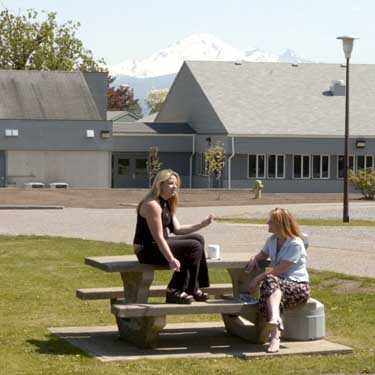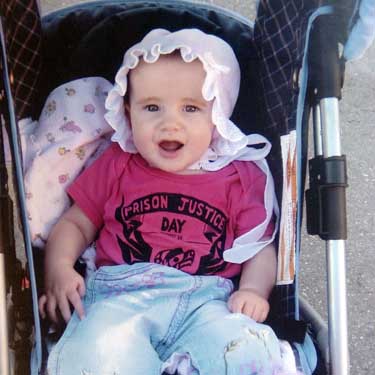Whitford, who will serve a four-year sentence for
manslaughter at Fraser Valley Institution, will be the
first inmate accepted into a little-used federal program
that will allow her to raise 11-month-old Jordyn in a
condominium on prison grounds.
"It's just been an
incredible struggle to keep that child with her and give
this woman one last chance at her life," her lawyer,
Bruce Kaun, said Thursday.
"She's doing really well... She's very clean right
now, and very articulate and very focused on raising the
child."
Whitford, who was sentenced on Wednesday, will be moved
soon to Fraser Valley Institution, where she and Jordyn
will live in a private unit with its own kitchen and a
park nearby, but will still be surrounded by fences and
monitored by guards.
"It's as homey as you can get in a prison... They
have cooking facilities, they have to learn to budget
and order healthy food for the children and themselves,"
Kaun said.
While the mother and child will not be among the
general prison population, other inmates may get an
opportunity to see or interact with the child.
"It's not an argument that we should send some more
kids to prison, but it does have an amazing impact on
the atmosphere in prison. Playing with a child or a baby
brings out the best in people, really," said UBC law
professor Michael Jackson, an expert in Canadian prisons
and, in particular, female inmates.
Life has been difficult for Whitford, right from her
birth in 1972 to her arrest in 2006 for shooting her
common-law husband - Jordyn's father - Anthony Ryan
Cartledge, 49, at their rural Prince George home.
Kaun read from a report prepared for Whitford's
sentencing hearing, which detailed a litany of abuse,
violence and addiction throughout her life.
Kaun said Whitford was determined to fight to keep
this baby, after three previous children were ultimately
seized by social services.
While she waited for her trial, she did not apply for
bail, and the B.C. Corrections system allowed her to
keep the baby after she gave birth in custody.
She offered to plead guilty to manslaughter, but the
challenge that emerged was convincing authorities to
allow her to keep the baby in a federal prison once she
started serving her sentence.
At least three federal prisons in Eastern Canada have
allowed a handful of female prisoners to raise their
babies, but the relatively new policy has not been
tested in the West, Jackson said.
Kaun said he had to fight the "behemoth protests" of
B.C.'s Ministry for Children and Families, which wanted
to seize the baby from Whitford before she went to
federal prison.
So, Kaun enlisted the help of UBC's Jackson, who
phoned corrections officials and started the ball
rolling to have Whitford involved in the federal
program.
"It was particularly important that she not lose this
baby," Jackson said Thursday, noting Whitford's troubled
past and that she had no relatives who could raise the
baby for her.
"That put me into high gear to try to first of all
get the federal institution to step up to the plate."
Lawyer Sarah Rauch, director of the First Nations Legal
Clinic at UBC, also got involved in the case and fought
the ministry, Jackson said.
"Lisa had been under the care of a wonderful doctor,
who has been supervising her and making sure that
everything is fine with the baby. [The doctor] wrote a
glowing report, about how whatever may have happened in
the past, this time around Lisa was a wonderful mom,
doing everything you'd expect of any mom whether she was
in prison or not," Jackson said.
"The baby was flourishing, she was healthy,
well-developed. In other words this was a very good
mother-child relationship. And It would be disastrous
for the baby if the baby was was taken away."
The program allows babies to stay with their mothers
in federal prisons until they are four years old.
If Whitford behaves in prison, by June 2009 she will be
eligible for outings with the child - who will be 27
months old then, Kaun said. So, if all goes well, he
said, Whitford will be out of jail before Jordyn is
four.
Generally speaking, inmates in Canada can be released
after serving two-thirds of their sentences.
Whitford and Jordan will be constantly supervised,
because the intent is that the best interests of the
child always be protected, Kaun said.
Under the Mother-Child program in Canada, a mother is
responsible for the full-time care of her child but has
access to pre- and post-natal services from public
health authorities, including counselling, nutrition
and breastfeeding advice.
Public Safety Minister Stockwell Day said Thursday he
wants the Correctional Service of Canada to review its
Mother-Child program to ensure Jordyn will be given the
highest care in prison.
Keith Coulter, CSC commissioner, has been asked to
review the prison program as the "best interests of the
child are the overarching priority in all such cases,"
Day said.
Jackson noted there are successful programs in U.S.
state jails that allow female inmates to keep their
children.
However, pregnant women entering any of the 114 federal
prisons in the United States are given the choice of
having an abortion or giving the child up for adoption
or to foster parents, said Federal Bureau of Prisons
official Felicia Ponce.
In Canada, after a child's fourth birthday, the child
can participate in a part-time program living with its
mother at weekends and during summer vacation and
holidays until it reaches the age of 12. At that age,
the child can participate in the private family visit
program.
Professor Linda Siegel of UBC's department of
educational and counselling psychology, said she would
have some concern about a baby's development if it were
not mixing with other children by the age of three.
But even more important is constant care by its
mother.
"Bringing up a child up in prison will obviously not
provide optimal conditions and it sounds grim but if the
mother is there and there's a consistency of care, that
would be the best thing rather than have it looked after
by a succession of other people," Siegel said.
Kaun, who was so touched by the case that he keeps a
photo of Jordyn on his fridge at home beside pictures of
his grandchildren, said Whitford hopes her story
provides hope for other women in federal prisons.
lculbert@png.canwest.com
gbellett@png.canwest.com

